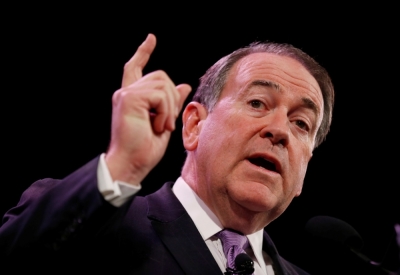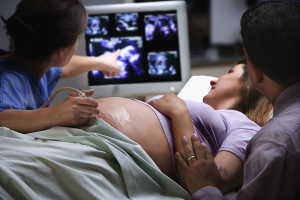Q&A with Gov. Mike Huckabee: COVID-19’s impact on religious freedom, elections
We recently had the chance to interview our Honorary National Chairman and former Governor of Arkansas, Mike Huckabee, to discuss the novel coronavirus’s economic and political implications, the upcoming 2020 elections and the importance of bringing faith to the voting booth.
This conversation has been edited for clarity and length:

People have a lot of things on their mind, but of course right now the thing that's most on their mind is COVID-19 and the response of our nation and our government to this pandemic. One viewer asked: Was the shutdown of our economy really necessary, and can the economy come back?
I think that the people making the decisions saw information that most of us are not going to have access to see, and I have confidence in the President. I have confidence in the people around him at the highest levels. There’s no way they would have done the things they did to shut down virtually the entire economy had they not been genuinely alarmed … If there was not confidence … that this was a serious public health risk and that this could become a pandemic that could potentially kill millions, I don’t think the actions would have been taken.
Can the economy come back? Yes, but it won’t come back quickly. The biggest problem that we’re facing is that a lot of small businesses will not be able to recover … their customer base has been shattered, their employees have scattered, the communities aren’t going to be the same.
So I think we’re looking at a long, long recovery. If there’s one bit of good news, it’s that the economy was on fire before this started. So we started from a place of strength rather than weakness, and that is the saving grace if there is one economically.
As a former governor, what are the factors those in state leadership should consider during states of emergency like the one we are living in?
You always want to position assets and resources so that if the worst happens you’re prepared for it. One of the reasons the shutdown happened was … that we don’t have a hospital healthcare system that is big enough to handle the potential cases that we saw coming. So it was a matter of overwhelming the health care system to a level that you would have people unnecessarily dying, so the steps that were taken to mitigate this were done so we didn’t overwhelm that healthcare system. Quite frankly, that’s been a good decision.
Many governors...are saying, “Let’s get things ramped back up, let’s open up the economy.”... Every state is different, and that’s why the President has pushed these decisions back down to the state level. That’s where they belong! The Tenth Amendment says that, and I still believe in the Constitution. But I will say this, that I think states need to start looking at how quickly can they get people back to work, even if it’s modified a little bit, and back to some routine, because nothing is worse than getting in a long-term lockdown to the point that we all end up with sort of what I call a public health version of the Stockholm Syndrome, where people start getting comfortable, used to the idea of lockdown and they’re afraid to leave.
We’ve got to get people moving back out doing their routine, going to church, for example. And we can’t have people saying that you can go to a drive-in liquor store but you can’t do a drive-in church service, which we’ve seen in Kentucky, Mississippi, and in Florida.
How should churches and individuals think about the balance of religious freedom and government control during these times?
We should very much be concerned, and here’s my fear: it’s one thing for us to have a period of weeks in which churches voluntarily do their services online or in the parking lot of the drive-in, but we don’t want a government that can say to a church, “We are suspending the First Amendment.” The very first right in the First Amendment is freedom of religion, followed by freedom of speech and freedom of assembly. To say that those have been suspended by the government, they better have a reason that’s overwhelming.
There have been some heavy-handed things in Tampa, Hillsborough County. The sheriff told the pastor of the church there that they could go ahead with their Sunday services as long as they practice social distancing and took precautions, which the church did — [invested] hundred thousand dollars in an air filtration system, put gloves on everyone, gave them all disinfectant. On Monday after they had the church service they were told they could have, the pastor was actually arrested and arraigned for it. This is a frightening thing, when the mayors of places like Greenville, Mississippi and Louisville, Kentucky started sending police officers to give tickets to people in their cars for $500 for attending a drive-in service.
This is the first wave of when [the] government says, “Hey, these people went along pretty willingly. The next time we have an issue and we want to make the church conform to something that’s politically correct, we’ll just tell them they can’t meet.” And we don’t ever get used to this idea that the government can tell us when we can gather, what we can say and how we can get around it.
So what do we do about it? Does it help to contact your elected officials?
Well, they do, especially when they know that you’re representing millions of potential voters. One of the reasons that I'm involved in My Faith Votes … is because in America alone there’s between 60 and 80 million professing evangelical Christians.
I think we contact our officials, but we also use our rights [as] citizens. Churches are fighting back. The church in Tampa, for example, enlisted the assistance of Liberty Council. Others are using Alliance Defending Freedom or Pacific Justice Institute, First Liberty Institute in Texas. All of these organizations are helping people defend themselves and actively fight for their rights, and we should not be critical of that. We should be grateful that these folks are standing up and really fighting for all of our basic fundamental constitutional rights.
What would you say to people who are concerned about how they will vote in November?
You should be. You should vote, however, use your faith and your values. Don’t vote for somebody because you think that he would be the ideal person to sit beside you in church. Ask, “Will the decisions this individual make empower me as a liberty-minded American, or will it maybe take some of my basic fundamental liberties away?” and “Will the people that he or she appoint, will they represent the things that are a great value and importance to me, or will they make decisions that fundamentally harm my ability to teach my children what I want to about biblical marriage, about gender identity?”
We’ve gotten a number of questions about what will happen when election season comes around, especially concerns around voter fraud. Are you concerned about that?
I’m concerned about voter fraud when there isn’t a COVID-19 going on. ...Voter fraud is real. I know people downplay it and say it doesn't really happen, but it does. Does it swing a lot of elections? Maybe not, but if it swings one, it’s one too many.
What I think we need to be worried about in the wake of COVID-19 and the government shutdown and social distancing and all the things that may keep people away from traditional voting methods is the idea of [voting] by mail without any accountability. How do we know that a person voted with integrity if they vote by way of the internet? Do they get a personalized code that once it’s used it can’t be used by anyone else? There are some things that could be done to make it safer, but as citizens, not just as Christians but as citizens, we need to demand transparency in the voting process. And we need to demand accountability for the manner in which the votes are registered, tabulated and accounted for.
One viewer asked: What Bible verse sticks out to you to focus on and read in preparation for the coming elections?
The one verse that has been my life verse since I was 15 was Philippians 4:13, “I can do all things through Christ who strengthens me.” And that means I can vote sensibly, I can serve as a citizen … everyone can have some involvement. But it’s not about how smart you are, it’s not about how tough or how important [or] well-informed you are. It’s “I can do all things,” and the key here is “through Christ who strengthens me.” Let us never forget that our strength does not come from our education or our affiliations with people or groups. It comes from our walk with God, and that’s why [you should] vote your faith. Don’t just vote your feelings, don’t just vote your friends’ feelings, vote your faith.
Pray, seriously pray. I believe that God answers our prayers ... if we say, “God, give me wisdom as to who to vote for.” If I didn’t believe God would answer that prayer I wouldn’t even suggest that we pray at all, but of course he will.
Watch the full interview on My Faith Votes’ YouTube Channel.
Visit myfaithvotes.org to get equipped to pray for our nation, pray for our leaders and to think biblically about issues and get prepared to vote in the upcoming elections.



























